Solo Mining vs Lottery Mining Explained: Key Differences You Should Know
- Published on
- Guides
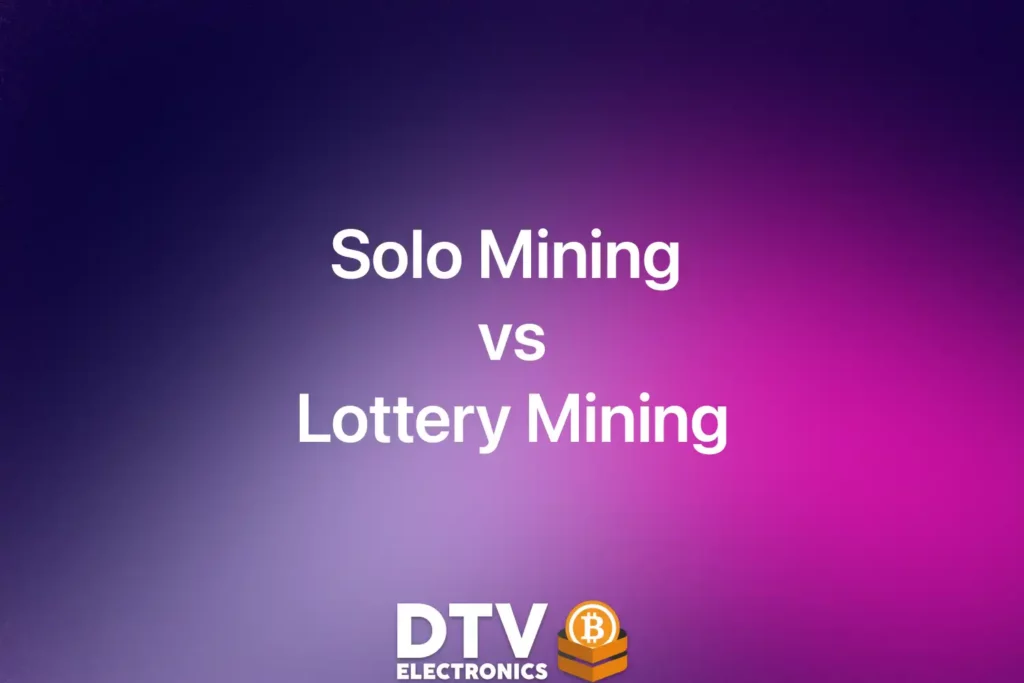
What Is Solo Mining?
Solo mining means you’re mining completely on your own, using your own hardware and connecting directly to your own full Bitcoin node. There’s no pool involved, no shared work, no third party between you and the network. If your machine finds a valid block, you receive the full block reward and transaction fees, every sat of it. There’s no middleman.
This method gives you full control and zero trust assumptions. You verify your own block templates, connect your ASICs to your own software, and submit blocks directly to the Bitcoin network.
However, it also means you bear 100% of the variance risk. If you don’t find a block, you earn nothing.
What Is Lottery Mining?
Lottery mining is often confused with solo mining, but there’s one key difference.
With lottery mining, you’re still mining alone, but you’re doing it through a solo mining pool, like CKPool or the hosted public-pool.io. These pools don’t distribute rewards among participants like traditional mining pools do. Instead, if you find a block while mining through them, you get the full block reward—minus a small fee charged by the pool operator.
You’re still taking on the full risk of variance, but you don’t need to necessarily run your own node, set up your own block templates, or maintain full network connectivity. The pool does that part for you.
So the core tradeoff is:
- Solo mining: Total independence, but higher technical overhead.
- Lottery mining: Easier setup, but you rely on a third party and pay a small fee.
Key Differences at a Glance
| Feature | Solo Mining | Lottery Mining (via solo pool) |
|---|---|---|
| Uses your own Bitcoin node | ✅ | ❌ (uses pool’s node) |
| Block reward if you win | 100% | ~98% (minus pool fee) |
| Requires running a full node | ✅ | ❌ |
| Setup complexity | Higher | Lower |
| Payout frequency | Very rare | Very rare |
| Trust level | Fully trustless | Some trust in pool operator |
Why People Try Either
People who solo mine usually fall into a few categories:
- They want full sovereignty and trustlessness.
- They have the technical skill and want to run their own infrastructure.
- They like the idea of being a full participant in the network.
- They’re okay with extremely infrequent rewards and are willing to run at a loss.
On the other hand, lottery miners are often looking for a middle ground. They’re still taking the same risk—earning nothing unless they hit a block—but without needing to run a full node or set up all the plumbing. They often use older or low-powered hardware and hope to win eventually, while spending very little.
Common Misunderstandings
- “If I use CKPool, I’m solo mining.” Actually it’s more accurate to say you’re lottery mining through a solo pool. You’re not running your own node, so it’s not fully solo in the original sense.
- “I can just plug in a miner and get rich.” Whether you’re solo or lottery mining, odds are not in your favor. Unless you have substantial hashpower, block discovery is rare and unpredictable. This is not a realistic income stream for most people.
So, Which One Makes Sense?
If you’re capable of running your own full node and block template software, and you value control, solo mining might appeal to you. It’s harder, but purer.
If you’re just looking to experiment or don’t want to deal with infrastructure, lottery mining through a solo pool might be a better fit. You still get the full block reward (mostly), but without the headaches.
Just know this: in either case, you’re taking a long shot. These methods aren’t about making consistent income. They’re about either participating in Bitcoin’s mining network directly, or taking a shot at a rare but large payout.
Best Solo Mining Solutions
If you want to truly do Solo Mining you should be at least aware of the fact that, first of all, you need to run your own node, pruned or full doesn’t matter, as long as you run your own node. Actually, you might be interested in our flagship product, the CmRat, as it works very well as a Bitcoin full node, which supports many “Bitcoin OS” such as Umbrel or StartOS, after that After you’ve downloaded the timechain, you can install a self hosted mining app such as Public Pool or DATUM let’s have a look at how they look.
Public Pool (Self Hosted)
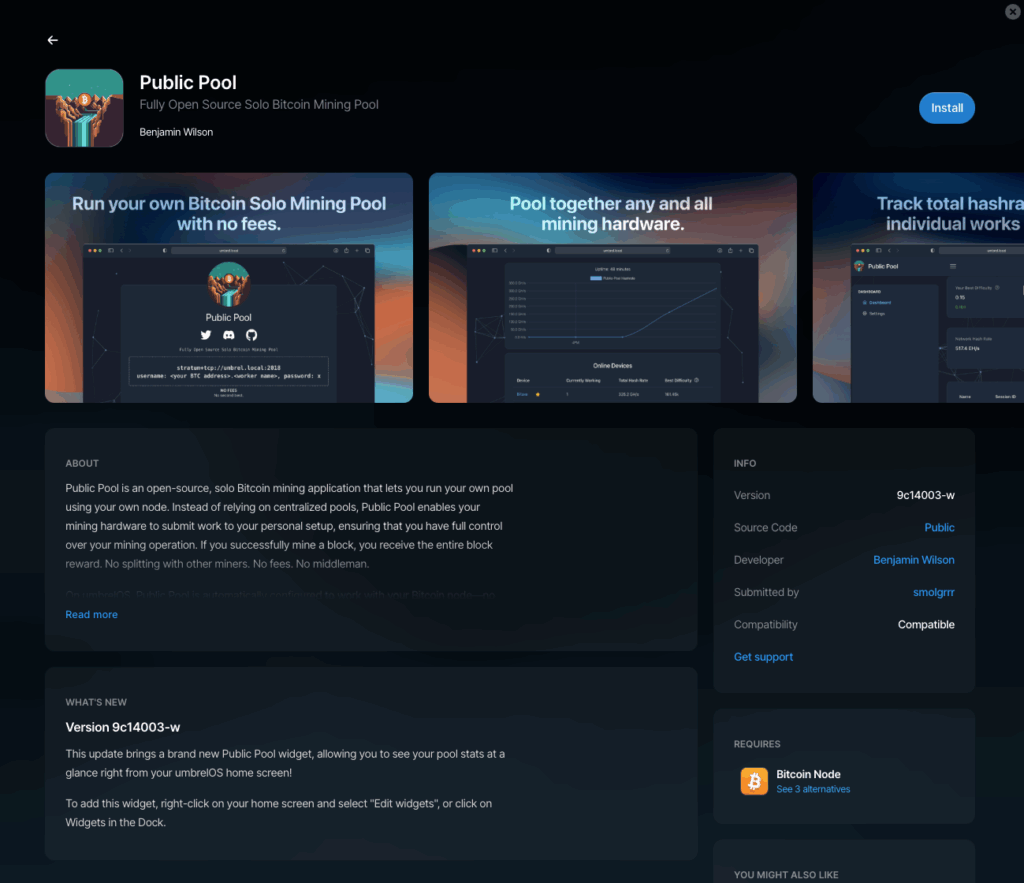
Public Pool is an open-source, solo Bitcoin mining application that lets you run your own pool using your own node. Instead of relying on centralized pools, Public Pool enables your mining hardware to submit work to your personal setup, ensuring that you have full control over your mining operation. If you successfully mine a block, you receive the entire block reward. No splitting with other miners. No fees. No middleman. On umbrelOS, Public Pool is automatically configured to work with your Bitcoin node—no extra setup required. Simply install the app, and it’s ready to go. To start mining, just point your mining hardware to your Public Pool instance using the stratum details provided in the app. Monitor your total hashrate, track individual miners, and receive rewards directly to your chosen Bitcoin address. Mine independently and help strengthen Bitcoin’s decentralization.
DATUM (Solo mining mode)
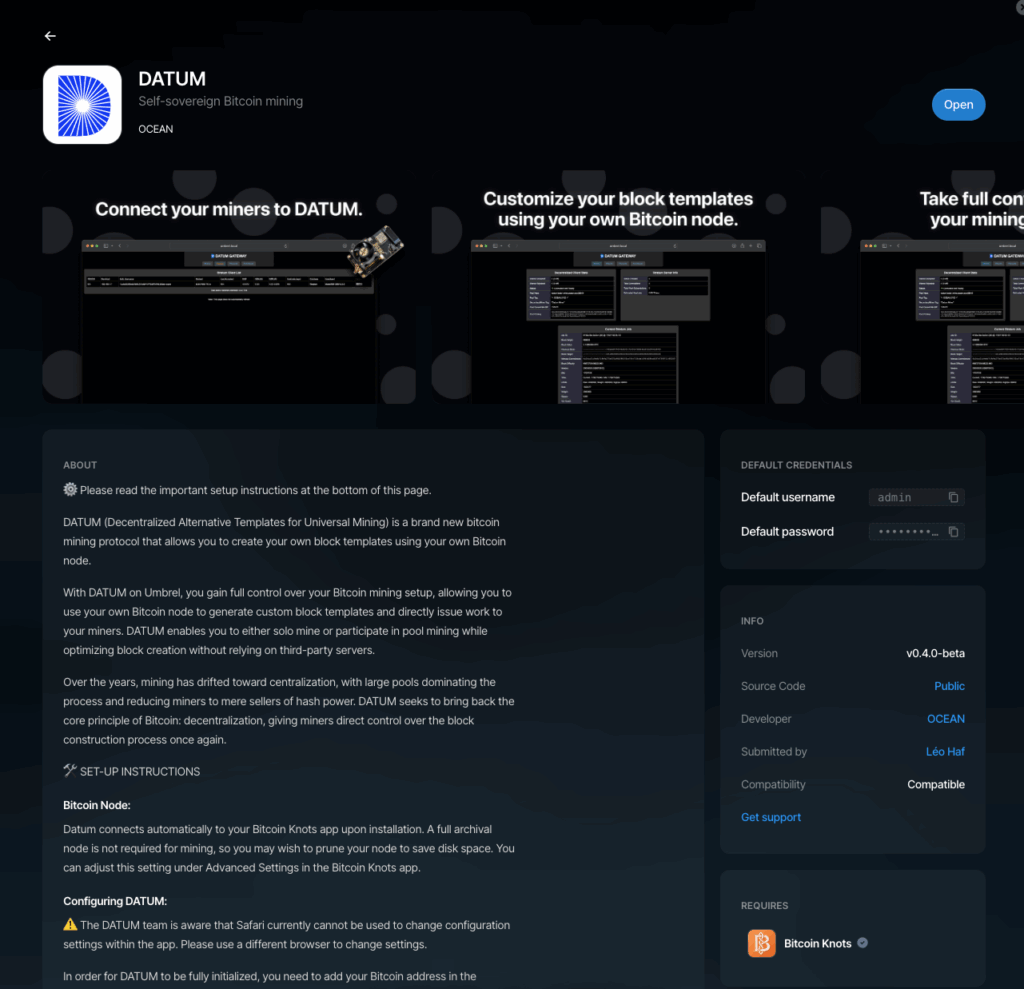
DATUM (Decentralized Alternative Templates for Universal Mining) is a brand new bitcoin mining protocol by OCEAN (Jack Dorsey & Luke Dashjr mining pool) that allows you to create your own block templates using your own Bitcoin node. With DATUM, you gain full control over your Bitcoin mining setup, allowing you to use your own Bitcoin node to generate custom block templates and directly issue work to your miners. DATUM enables you to either solo mine or participate in pool mining while optimizing block creation without relying on third-party servers. Over the years, mining has drifted toward centralization, with large pools dominating the process and reducing miners to mere sellers of hash power. DATUM seeks to bring back the core principle of Bitcoin: decentralization, giving miners direct control over the block construction process once again.
Best Lottery Mining Solutions
If you’re not quite ready to commit to running your own node or managing a full self-hosted setup, but still want a shot at mining a block and claiming the full reward, lottery mining could be a good middle ground. You don’t earn steady payouts like in pool mining, but if you’re lucky enough to find a block, it’s all yours—fees, subsidy, everything. These setups are easier to get started with, usually require just your miner and a Bitcoin address, and some even operate in a completely non-custodial way.
Public Pool (Hosted)
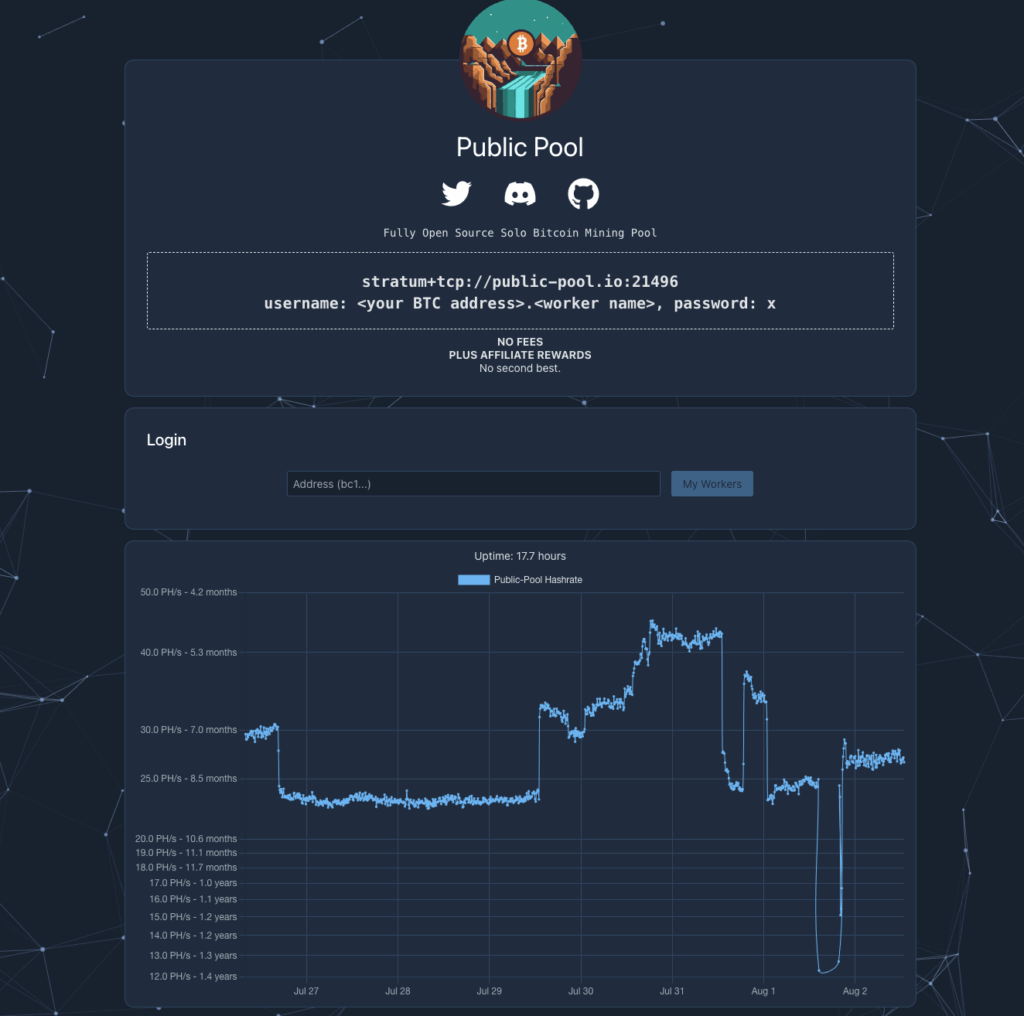
For those who like the philosophy behind Public Pool but aren’t ready to self-host, there’s also a hosted version. It offers the same principles: no pool fees, no custodianship, and full reward payout directly to your wallet. All you need to do is configure your ASIC miner with the stratum address provided on the Public Pool site, enter your Bitcoin address, and start hashing. This is a plug-and-play way to try lottery mining with almost no setup, although it’s not really solo mode as you are not creating your own block, but you put trust in Public Pool’s one. The odds of finding a block depend on your hash rate and Bitcoin’s total network difficulty. It’s ideal for small-time miners who want to contribute to decentralization without dealing with infrastructure.
Also, thanks to their Affiliate Rewards program, you can get discounts on mining hardware by purchasing through the affiliate links below. On top of that, each month the miner who submits the highest difficulty share gets 100% of the affiliate earnings as a bonus reward. So even if you don’t hit a block, there’s still a chance to earn something extra.
CK Pool (Solo CK)
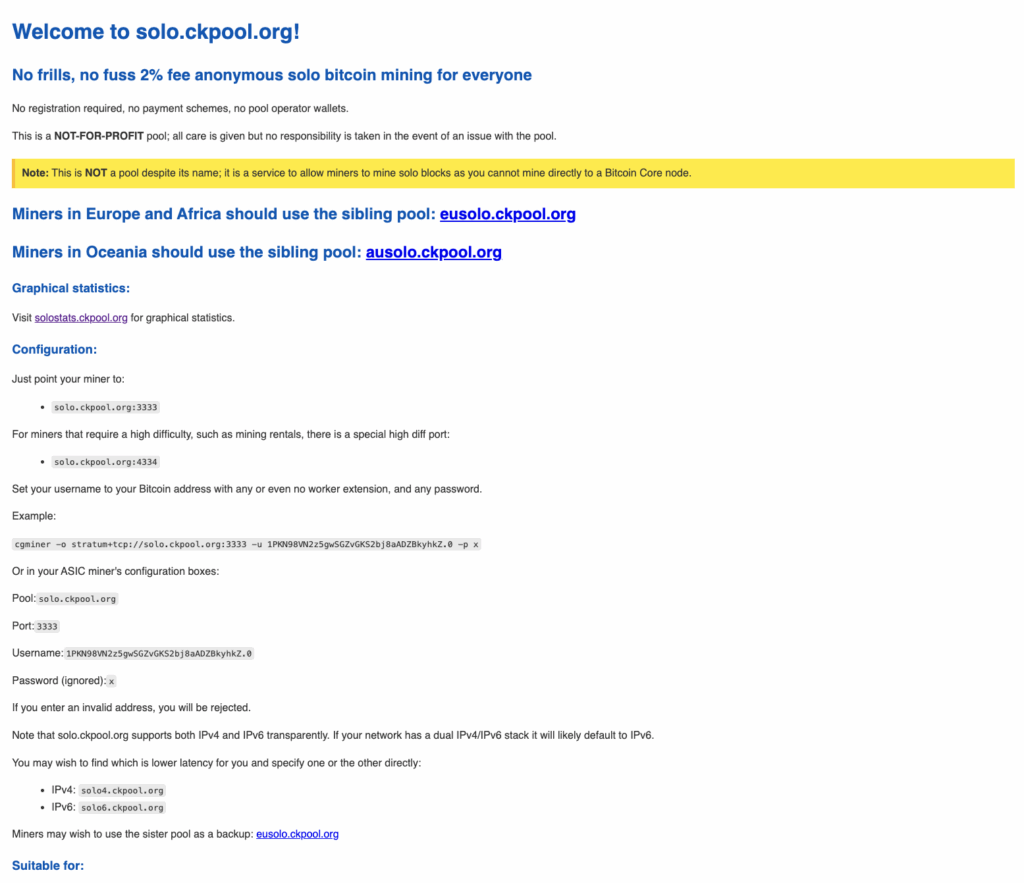
Solo CK by Con Kolivas is probably the most well-known and time-tested solution for lottery mining via a hosted pool. It’s been around for years and has a strong reputation for reliability and transparency. The pool doesn’t take a fee unless you actually find a block, and even then it’s just a small cut. All you need to do is point your miner to their stratum address and use your Bitcoin address as the username. CK Pool will attempt to find a block using your hash power, and if you’re lucky enough to succeed, the full reward (minus a 2% fee) gets paid directly to you. No need to register or provide any personal data. It’s a true set-it-and-forget-it approach for those who still believe in the possibility of finding a block.
Conclusion
Whether you go full sovereign with solo mining or take the easier route through lottery mining, both paths reflect a deeper commitment to decentralization. You’re not outsourcing your role in Bitcoin’s infrastructure. You’re stepping up, playing a part, and taking the risk yourself.
Solo mining offers full control but comes with a steeper learning curve and the burden of setting up and maintaining your own infrastructure. Lottery mining lowers that bar by outsourcing some of the technical heavy lifting, while still giving you a shot at the full block reward. Both are a far cry from traditional pool mining, where you’re just a cog in a bigger machine.
Need Hardware to Get Started?
If you’re thinking about trying solo, lottery (or even pooled) mining yourself, check out DTV Electronics Store. We stock a wide range of mining gear, including multiple Bitaxe models, the Canaan Avalon Nano 3S, and even preconfigured Bitcoin full nodes that are ready to plug in and sync. Whether you’re building a full setup for self-hosted solo mining or just want a compact, low-power miner to try your luck through CK Pool, you’ll find solid options there.

